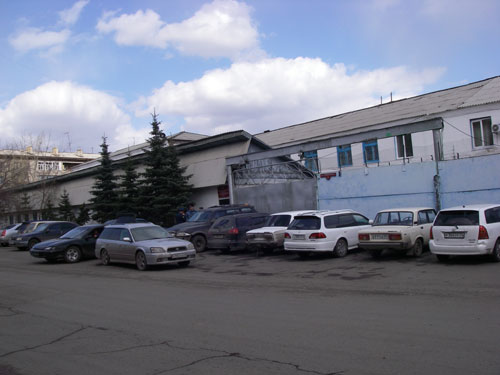









During the time of compulsory acquisition of rich farmers, the authorities began to send more and more trains with special settlers to Krasnoyarsk. Very soon it turned out that the transit prison situated on Republic Street did not suffice to receive the streams of deported people. Moreover, they were confronted with serious problems concerning the transportation of the deportees to the Yenisey - for it was a long way from Republic Street to the river. For this reason transit camps were built at Yenisey and Zlobino stations. From there, special resettlers and prisoners were taken further to the north, but also to the southern districts of the territory, on barges (a s of the middle of the 1930s to the Norillag and as from the late 1940s to the camps of construction project N° 503.). The streams of farmers arriving in the 1930s were all directed to the north (they came from southern districts – such as Khakassia and the Altai Region, from the west – from the central and western parts of the USSR, and from the east – from the Baikal region and the Irkutsk region), while the poeples deported in the 1940s were already scattered all over the Krasnoyarsk region - in its southern districts, too.
And this is how Walter Ruge, who served his sentence in one of the camps of construction project N° 503, describes the transition camp:
“It is very hard for any civilized person to comprehend how a transit camps look like. It turns out to be a huge bubbling kettle, in which the immeasurable number of inmates sloshes from one end to the other. The people are dealing with eachother, they steal, come to blows, drink schnaps and pass the time playing with self-made cards, for which they land either in the punishment cell or in the so-called BUR, the disciplinary camp barracks. We, the political prisoners were just called „fraier“ (pigeon, individual who does not belong to the thieves' world + who is preyed upon; translator’s note); we were sitting on our bundles that contained our few belongings, trembling in our boots, uneasily looking around. Within the first three hours the criminal pack thieved literally everything I had owned: a pair of lace-up shoes, the complete sack with unerwear, some modest medical literature, which I had taken along to roll cigarettes, my entire provision of dried bread and a little cushion, which the medical personal in Omsk had handed over to me as a farewell gift. This large-scale robbery of clothes took place inside the bath-house. We had to leave all our clothes for “disinfection”, and when we came out of the steam chamber we discovered that our clothes “had gone”. We had to stay there all naked as the day one was born. As a replacement for your own clothes they gave you third-hand rags, and from now on they would number you among the “promotchiks” of the state (person who has misappropriated government property; translator’s note). I was distributed some quilted jacket, which I was to pull on without underwear beneath, quilted trousers and buskins, which one of the vagabonds foisted on me in replacement of my own shoes”.
Today the reform labour colonies N° 6 and N° 22 are located at Yenisey Station, right in the place of the former transit camp.
